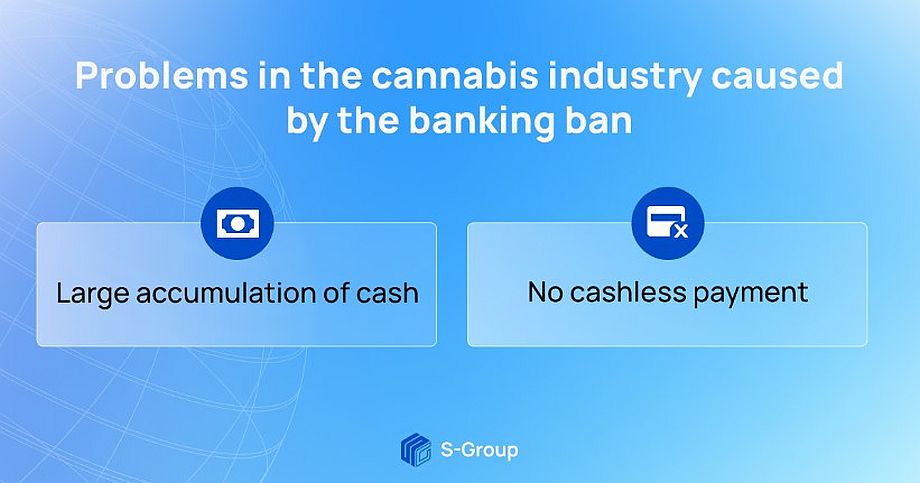Cannabis and Cryptocurrency
The spheres of cannabis and cryptocurrency are united by the fact that they are at the stage of active development and formation. The gradual legalization of these spheres around the world is causing them interest among investors.
How are the cannabis and cryptocurrency industries connected and how does each of the spheres influence each other’s processes? We tell in the article.
Cryptocurrency payments in the cannabis industry
Since cannabis is not yet legal in many countries, official sellers cannot accept bank payments. This created difficulties for dispensaries that specialize in cannabis treatment and for private legal distributors.
1) A large accumulation of cash has increased the number of attacks on cannabis points of sale and specialized institutions.
2) No cashless payment has reduced the influx of customers. Official distributors accepted payment only in cash, which is inconvenient for some consumers. Therefore, buyers were looking for informal markets with the option of cashless payments.
Cryptocurrency payments have become a solution to these problems of the canna-industry. Initially, companies and distributors were wary of cryptocurrencies due to low transaction speeds and withdrawal difficulties. But with the development of the crypto industry, transactions have become faster, and converting cryptocurrency to fiat is easier. Thus, the cryptocurrency began to be perceived as an effective alternative to traditional payment methods.
Cryptocurrencies Designed for the Cannabis Industry
In addition to the well-known cryptocurrencies, cryptocoins and cannabis tokens have been created. Their developers were afraid of sharp rises and falls of main cryptocurrencies such as Bitcoin and Ethereum, which could lead to difficulties in paying and receiving the final amount for products. Therefore, they developed cryptocurrencies specifically for the legal distribution of cannabis and the simplification of financial transactions in the industry.
Three Popular Cryptocurrencies Designed for the Cannabis Industry
1) PotCoin (POT). Cryptocurrency was created in 2014 in connection with the legalization of cannabis in Colorado. It began to develop actively in 2017. Now PotCoin has its own ecosystem and the PotCoin Foundation, which funds the development of the ecosystem, as well as events and projects for the crypto community.
Users can exchange POT cryptocurrency directly on the Peer-to-Peer platform of the ecosystem. They can buy POT on Bittrex, QuickSwap and TradeOgre crypto exchanges. Users can also earn passive income by participating in staking.
2) CannabisCoin (CANN). Cryptocurrency was developed in 2014 to facilitate payment in pharmacies selling medical marijuana medicines. Initially, the cryptocurrency was intended to exchange one CANN coin for one gram of a cannabis medicine. Now it is used to pay for goods and services in the sphere of cannabis. The CannabisCoin cryptocurrency has an ecosystem with its own crypto wallet for financial transactions.
3) Cannacoin (CCN). Cryptocurrency was created in 2014 as an alternative instant payment system for the selling of cannabis. It can be used for exchange, settlement and storage in the industry of cultivation and distribution of cannabis. The developers plan to create a Cannacoin ecosystem, which will include a wallet, exchange and payment system.
Investment in the cannabis industry
Companies developing and distributing cannabis products have had difficulty attracting investment. This is due to restrictions in the banking sector for the industry. The use of cryptocurrency simplifies the process of raising funds for companies and foundations in the following ways:
– one-time investments from private investors in cryptocurrency;
– issue of the company’s own tokens, which are traded on the official markets and increase its capitalization;- raising funds in companies and foundations with the help of security token offering (STO) — tokenized IPO.
Security token offering (STO) is the issuance of company shares in the form of security tokens, which are placed on special exchanges and purchased by investors as traditional securities. Thus, the company creates a public offer and attracts investments in the shortest possible time.
For example, Global Cannabis Holdings made an STO in 2021. They issued security tokens on the Ethereum blockchain and raised $500,000 worth of funds for further capitalization and expansion. This allowed them to scale and enter new markets within a year.
Cannabis and Cryptocurrency – Conclusion
The cannabis and crypto industries interact effectively. Cryptocurrency payments have become an alternative to the banking system for the cannabis trade and have made it easier to conduct legal business. The cryptosphere also allows companies in the cannabis industry to attract investments faster in order to expand and enter new markets.
Through cooperation with cannabis producers and distributors, the cryptosphere receives new investors, promising cryptocurrencies and more trust, which increases the market capitalization and contributes to the development of the industry.




